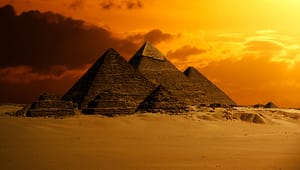Egypt’s complicated history can be traced all the way back to the days before Christ, and with such a legacy, it’s easy to see how this region became one of the most impressive civilizations on earth. Egyptians were pioneers of language and art, influencing several other cultures in the world today. Egypt has a lengthy history starting with the creation of the Kingdom in 3180 BC. The Nile River and the semi-isolated position of the region helped to make Egypt one of the most fruitful civilizations the world has ever seen. After the establishment of the Kingdom, multiple dynasties continued to rule, marked by the Pharoahs until the last fell to the Persian Empire in 341 BC. The Persians were replaced by the Greeks, who were then displaced by the Romans, and finally the Byzantines. The fourth century brought the arrival of the Fatamids who introduced the Islamic religion to the region and ruled until the 10th century. 1869 marked the opening of the Suez Canal which made Egypt a center of world transport – something many superpowers wanted to control. Britain occupied the region from 1882, but that ended in 1936 as a result of WWII. In 1952, Colonel Nasser claimed the Suez Canal under public ownership, a move which would not sit well with international powers. An Anglo-French-Israeli military operation attempted to depose Nasser but failed. The Six-Day War in 1967 saw Egypt lose the Gaza Strip and Sinai Peninsula to Israel and in 1973, both sides signed a peace treaty. Hosni Mubarak, who held the position of president for almost 30 years, stepped down in 2011 after mass uprisings across the country called for extreme political and social change. Currently, the country is under military leadership.
Egypt has a rich culture which spans thousands of years and was one of the earliest and greatest civilizations the world has ever seen. The Pharaonic era was a defining period, and has influenced many around the world. The Egyptians pioneered many things, including written language. Hieroglyphic inscriptions are a testament to the ancient Egyptians’ forward-thinking ways. Egypt was also one of the first civilizations to introduce design into its art. The carefully planned wall paintings and engravings on the pyramids and tombs were precursors to today’s drawings and paintings. The religion of Islam, practiced by 90 percent of the country’s population, profoundly influences the culture of today. Not just followed on certain holy days, it is a part of everyday life. As such, women traveling to the region are advised to dress modestly, especially when entering places of worship.

